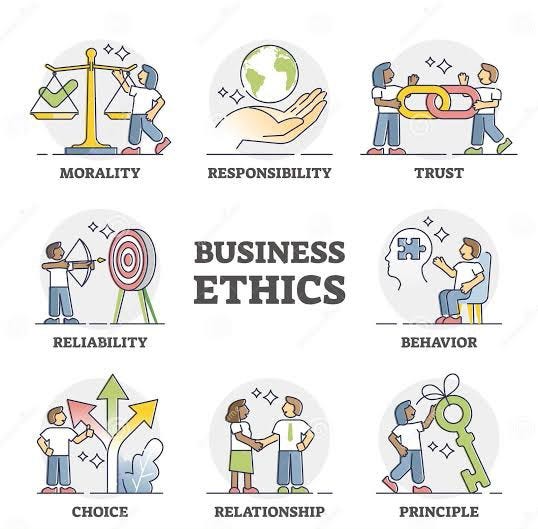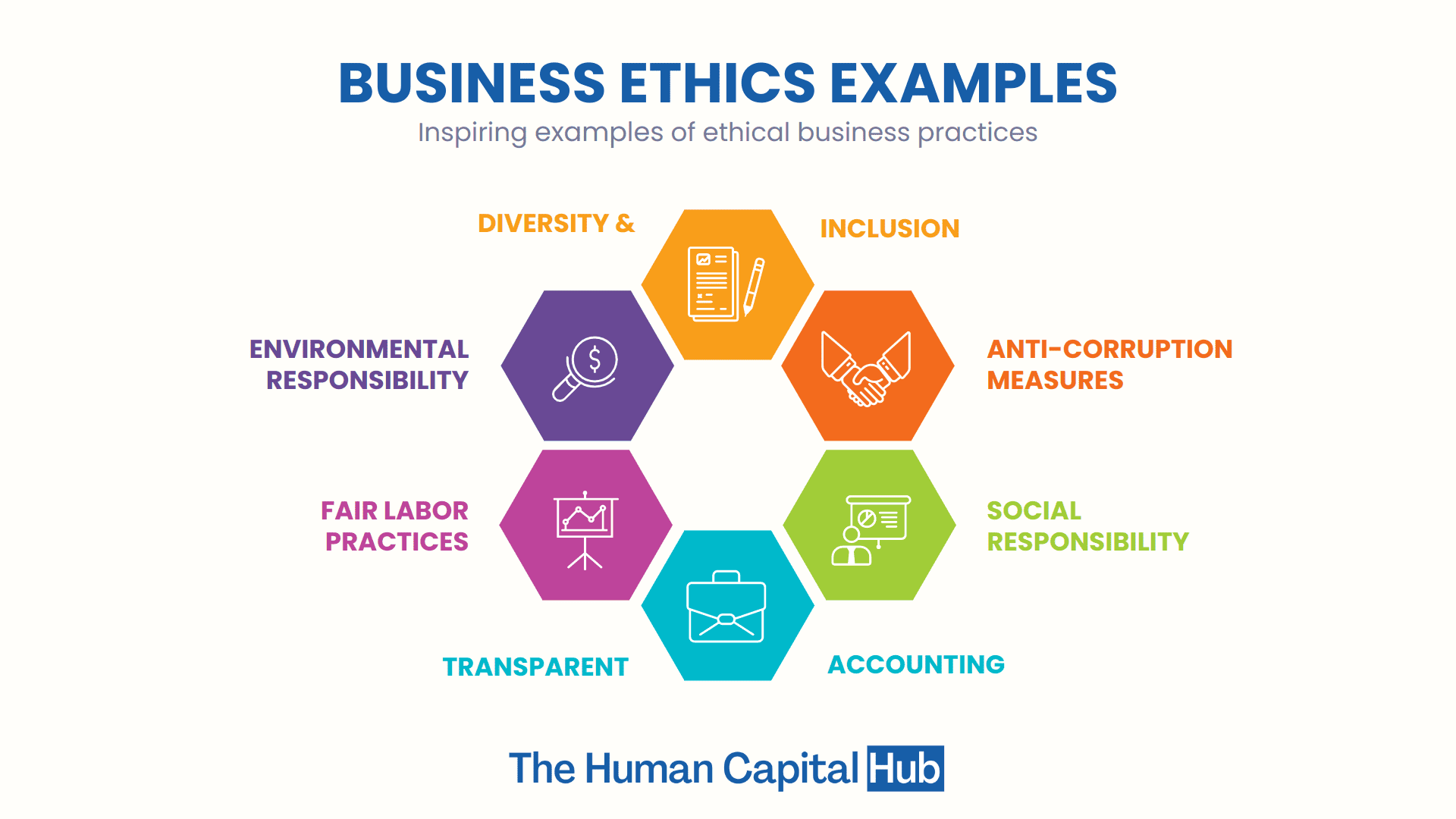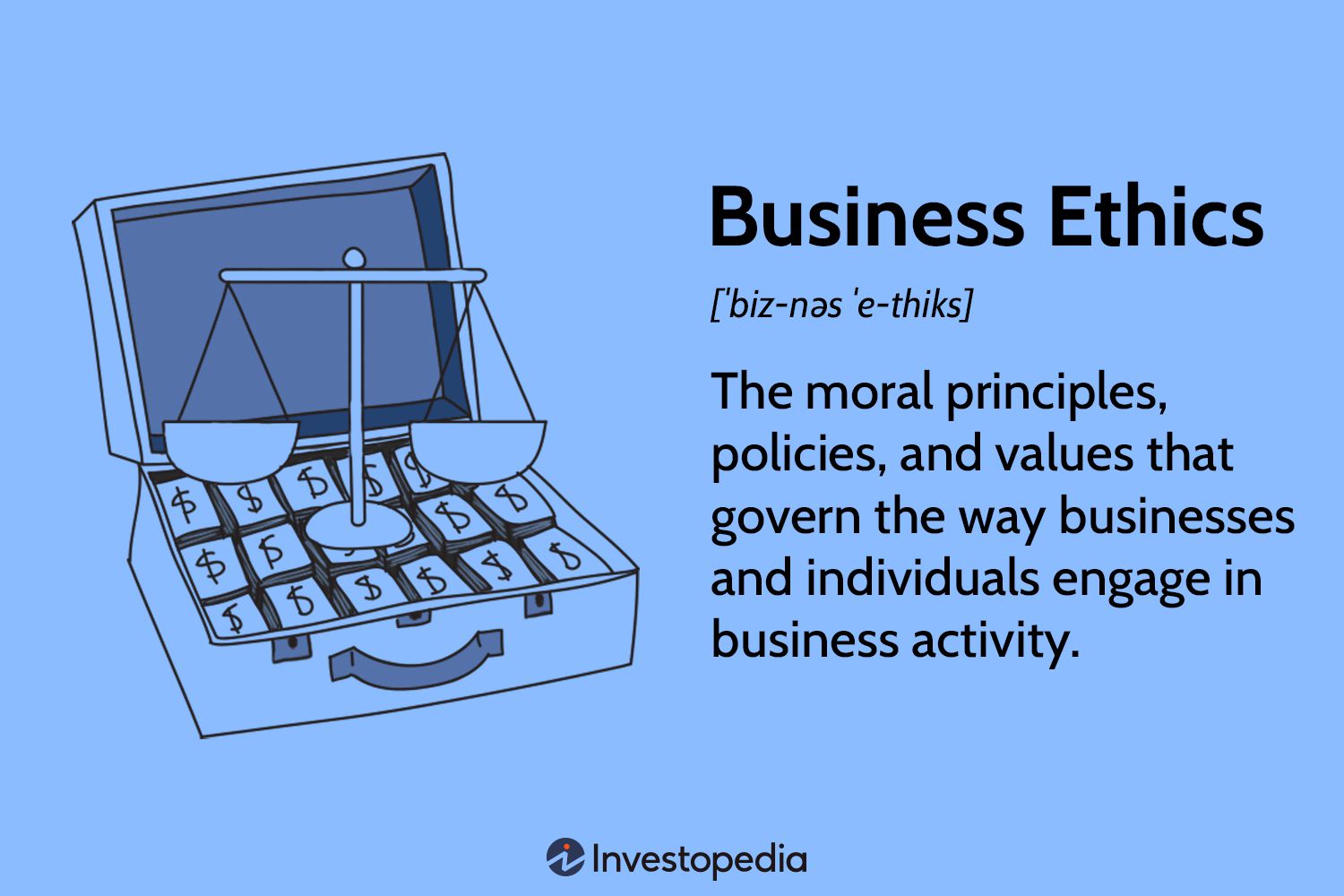Ethics in business practices ensure trust and integrity. They foster long-term success and sustainable growth.
Ethics play a crucial role in business by guiding decision-making and behavior. Ethical practices create a positive reputation and build customer loyalty. Companies adhering to ethical standards often enjoy increased employee satisfaction and reduced legal risks. Businesses that prioritize ethics cultivate trust among stakeholders, which is vital for long-term success.
Ethical behavior also attracts investors and partners, enhancing business opportunities. By embedding ethics into their core values, companies can navigate challenges effectively and maintain a competitive edge. Thus, ethics are not just moral imperatives but strategic assets that drive sustainable growth and success.
Introduction To Business Ethics
Ethics in business is more important than ever. Companies face scrutiny from customers, governments, and the public. Ethical business practices build trust and foster positive relationships. This section introduces the basics of business ethics.
Definition Of Ethics
Ethics are moral principles that guide behavior. They help distinguish right from wrong. In business, ethics ensure fair practices. They protect stakeholders, including employees, customers, and the community. Ethical businesses avoid harm and promote good.
Importance In Business
Ethical practices are crucial for business success. They help in building trust with customers. Trust leads to customer loyalty. Loyal customers are repeat buyers. They also spread positive word-of-mouth.
Ethical businesses attract and retain top talent. Employees prefer workplaces with strong ethical values. They feel safe and respected. This boosts productivity and reduces turnover.
| Aspect | Impact of Ethics |
|---|---|
| Customer Trust | Increases loyalty and sales |
| Employee Satisfaction | Enhances productivity and retention |
| Public Image | Improves brand reputation |
Ethical businesses also have a better public image. They are seen as responsible and reliable. This attracts more customers and investors. It also helps avoid legal issues. Unethical practices can lead to lawsuits and fines.
In summary, ethics in business are essential. They ensure fairness and build trust. They attract customers, employees, and investors. They help businesses grow and succeed.
Historical Perspective
The role of ethics in business practices has evolved over centuries. Understanding its historical perspective helps us appreciate its importance today. This section delves into the early ethical practices and their evolution over time.
Early Ethical Practices
In ancient civilizations, ethics in business were crucial. Businesses operated on trust and fairness. Ancient Egypt and Mesopotamia had ethical codes. Traders used written agreements to ensure fair practices. These agreements covered prices, weights, and measures.
In ancient Greece, philosophers like Aristotle emphasized ethical business. He believed in honesty and fairness. Roman laws also enforced ethical practices. They had strict rules against fraud and unfair competition.
Evolution Over Time
During the Middle Ages, guilds controlled business ethics. They set standards for quality and fair trade. Guilds ensured that members followed ethical practices. Violators faced penalties or expulsion.
The Industrial Revolution brought new challenges. Rapid growth led to unethical practices. Child labor and unsafe working conditions became common. Public outcry led to reforms. Governments introduced labor laws and safety regulations.
In the 20th century, corporate social responsibility (CSR) emerged. Businesses started focusing on ethical practices and social responsibility. CSR initiatives addressed environmental issues and community well-being.
| Era | Key Ethical Practices |
|---|---|
| Ancient Civilizations | Trust, fairness, written agreements |
| Middle Ages | Guild standards, quality control |
| Industrial Revolution | Labor laws, safety regulations |
| 20th Century | Corporate social responsibility |
Core Ethical Principles
Ethics play a crucial role in business practices. Following core ethical principles ensures trust and respect. These principles guide behavior and decision-making. Let’s explore some key ethical principles in business.
Integrity
Integrity is the foundation of good business. It means being honest and fair. Companies with integrity build trust. They do the right thing even when it’s hard. Customers and employees value integrity.
Integrity also means keeping promises. Businesses should deliver what they promise. This builds a strong reputation. Integrity leads to long-term success. It creates loyal customers and motivated employees.
Transparency
Transparency is about being open and clear. Businesses should share information honestly. This includes financial details and business practices. Transparency builds trust with customers and stakeholders.
Businesses should avoid hiding information. Hidden information can lead to mistrust. Transparency also involves clear communication. Companies should explain their decisions and actions. This helps everyone understand and support the business.
Transparent businesses are seen as trustworthy. They attract loyal customers and investors. Transparency also helps in building a positive brand image.

Credit: medium.com
Ethics In Decision Making
Ethics play a vital role in business decision-making. Choosing the right path often involves moral dilemmas and ethical frameworks. This section explores these aspects to help businesses make better choices.
Moral Dilemmas
Moral dilemmas are situations where choices conflict with ethical principles. Business leaders often face these challenging scenarios. They must balance profit with doing what’s right. For example, a company may need to decide between cost-cutting and employee welfare. Both options have significant consequences.
Consider the following common moral dilemmas in business:
- Choosing between profit and sustainability
- Balancing employee needs with shareholder demands
- Deciding on transparency versus competitive advantage
Understanding these dilemmas helps in making informed decisions. It allows leaders to weigh the pros and cons effectively.
Ethical Frameworks
Ethical frameworks provide guidelines for making decisions. They help businesses navigate complex moral landscapes. Two popular frameworks are deontological and consequentialist ethics.
| Framework | Focus |
|---|---|
| Deontological Ethics | Focuses on rules and duties |
| Consequentialist Ethics | Focuses on outcomes and consequences |
Deontological ethics stress the importance of following rules. For instance, always being honest, regardless of the outcome. Consequentialist ethics consider the results of an action. For example, choosing an action that benefits the most people.
Using these frameworks helps in making consistent and fair decisions. It ensures that actions align with the company’s core values.
Incorporating ethics in decision-making builds trust and credibility. It fosters a positive reputation and long-term success. Businesses that prioritize ethics stand out in the competitive market.
Corporate Social Responsibility
Corporate Social Responsibility (CSR) is essential for modern businesses. It involves companies taking responsibility for their impact on society. This includes environmental, social, and economic aspects. CSR helps businesses build trust and loyalty with customers. It also promotes sustainable growth and positive change.
Environmental Impact
Businesses must consider their environmental impact. Reducing pollution and waste is crucial. Companies should adopt eco-friendly practices. This includes using renewable energy and recycling materials. Sustainable sourcing of raw materials is also important. These steps help protect the planet for future generations.
Community Engagement
Community engagement is a key part of CSR. Companies should support local communities. This can be done through various initiatives, such as:
- Donating to local charities
- Organizing volunteer programs
- Supporting local businesses
Engaging with the community builds strong relationships. It shows that the company cares about people. This can lead to a positive reputation and customer loyalty.
In summary, CSR is vital for business success. By focusing on the environmental impact and community engagement, companies can make a positive difference.
Ethical Leadership
Ethical leadership is about guiding others with integrity and fairness. Leaders who prioritize ethics inspire trust and loyalty. They set the standard for behavior in their organizations.
Role Of Leaders
Leaders play a crucial role in shaping ethical practices. They must demonstrate ethical behavior in their actions. This means being honest, transparent, and accountable. Employees look up to their leaders for cues on how to act.
- Integrity: Leaders should always do what is right, even when it is hard.
- Transparency: Share information openly with the team.
- Accountability: Own up to mistakes and learn from them.
Building Ethical Cultures
Creating an ethical culture starts from the top. Leaders must embed values into the company’s core. This involves establishing clear policies and procedures. Train employees on ethical standards regularly.
Encouraging open communication is also vital. Employees should feel safe to report unethical behavior. Recognize and reward ethical actions to reinforce positive behavior.
| Strategy | Action |
|---|---|
| Establish Policies | Write clear guidelines on acceptable behavior. |
| Training Programs | Conduct regular ethics training sessions. |
| Open Communication | Create safe channels for reporting issues. |
| Recognize Ethics | Reward employees who demonstrate ethical behavior. |
By focusing on these strategies, leaders can build a strong ethical culture. This not only benefits the company but also society as a whole.
Challenges In Business Ethics
Ethics in business is essential. But there are many challenges. These challenges can impact decisions and practices. Let’s explore two main challenges in business ethics.
Globalization
Globalization connects businesses worldwide. This creates many ethical challenges. Different countries have different laws. What is legal in one country may be illegal in another. This can cause conflicts and confusion.
For example, consider labor practices. Some countries allow child labor, but others do not. A company must decide what is ethical. Should they follow local laws or their own ethical standards?
| Country | Labor Law |
|---|---|
| Country A | Allows child labor |
| Country B | Prohibits child labor |
Technological Advancements
Technological advancements bring new ethical issues. Data privacy is a big concern. Companies collect a lot of data. They must protect this data and use it ethically.
Artificial intelligence (AI) also raises questions. AI can make decisions without human input. This can lead to biased or unfair outcomes. Companies must ensure AI is used ethically.
- Protecting user data
- Ensuring fair AI use
- Maintaining transparency

Credit: fastercapital.com
Case Studies
Examining case studies reveals the profound impact of ethics in business practices. These examples show both triumphs and failures. They offer valuable lessons for businesses aiming for ethical excellence.
Successful Ethical Practices
Some companies have thrived through strong ethical foundations. Their stories can inspire others to follow suit. Here are a few notable examples:
- Patagonia: This outdoor brand is known for its environmental ethics. They use recycled materials and promote sustainable practices.
- Ben & Jerry’s: The ice cream company emphasizes social justice. They support fair trade and community projects.
- TOMS Shoes: They follow a “One for One” model. For every pair of shoes sold, they donate a pair to a child in need.
Failures And Lessons Learned
Not all companies have succeeded in maintaining ethical practices. Some have faced severe backlash due to unethical behavior. These cases offer critical lessons:
| Company | Unethical Practice | Outcome |
|---|---|---|
| Enron | Accounting fraud | Bankruptcy and loss of trust |
| Volkswagen | Emissions scandal | Huge fines and damaged reputation |
| Wells Fargo | Fake accounts scandal | Massive fines and lost customer trust |
Companies like Enron and Volkswagen serve as cautionary tales. Their unethical actions led to severe consequences, both legally and reputationally. Businesses can learn from these mistakes to avoid similar pitfalls.
Future Of Business Ethics
The future of business ethics is bright and evolving. Companies are realizing the importance of ethical practices. Ethical businesses attract loyal customers and talented employees. Let’s explore emerging trends and sustainable practices in business ethics.
Emerging Trends
New trends are shaping business ethics. One trend is transparency. Companies now share more information with the public. This builds trust and credibility.
Another trend is diversity and inclusion. Businesses are focusing on hiring diverse teams. They value different perspectives and ideas. This leads to better decision-making and innovation.
Technology also plays a role. Artificial Intelligence (AI) helps in ethical decision-making. AI can identify unethical practices and suggest improvements. This ensures fairness and accountability.
Sustainable Practices
Sustainability is key to the future of business ethics. Companies are adopting green practices. They reduce waste and use renewable energy. This helps protect the environment.
Businesses are also investing in ethical supply chains. They ensure fair wages and safe working conditions. This supports human rights and social justice.
| Sustainable Practice | Benefit |
|---|---|
| Renewable Energy | Reduces carbon footprint |
| Fair Trade | Supports ethical suppliers |
| Waste Reduction | Minimizes environmental impact |
Here are some steps businesses can take for sustainability:
- Adopt recycling programs
- Use energy-efficient equipment
- Encourage remote work to reduce emissions
- Source from ethical suppliers
By embracing these trends and practices, businesses can thrive ethically. They will build trust and ensure long-term success.

Credit: www.thehumancapitalhub.com
Conclusion
Ethical business practices build trust and credibility. Companies benefit from improved reputation and customer loyalty. Strong ethics foster a positive work environment. Prioritizing ethics ensures long-term success and sustainable growth. Incorporate ethical principles to achieve lasting business excellence.

